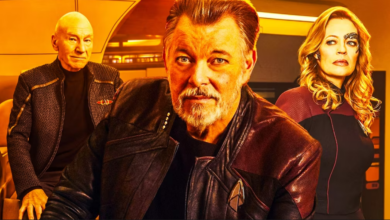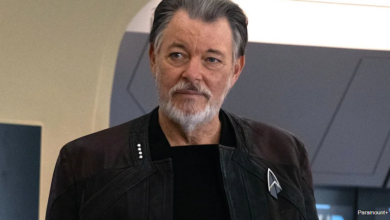The Most Important Lesson Star Trek’s Patrick Stewart Learned From Playing Picard

If we’re to accept “Star Trek” as a workplace drama — which it may be first and foremost — then one of the central themes of the entire franchise would be an examination of healthy managerial styles. Captain Kirk (William Shatner) was a manager who ran on instinct and preferred to have a hand in most decisions. He listened to the instincts of his crew as well, when it pertained to their fields of expertise, but listened to himself first and foremost. Captain Picard (Patrick Stewart), in contrast, was more socially cold — he rarely socialized with his crew during off-duty hours — but was far more egalitarian when it came to communicating with his senior staff; Picard frequently asked for suggestions from his crew when they were embroiled in a crisis, and he often took their advice (unless they were Worf).
Meanwhile, Captain Sisko (Avery Brooks) was stern and strict when on duty, but would relax in one-on-one conversations outside of Ops. Captain Janeway (Kate Mulgrew) was enthused and no-nonsense but edged deeply into a captain-knows-all authoritarianism. Captain Archer (Scott Bakula) was an affable, casual Boy Scout who encouraged friendliness. Captain Burnham (Sonequa Martin-Green) is a weepy, ultra-sentimental captain given to fits of extreme violence. Captain Freeman (Dawnn Lewis) aims to be ambitious and strict but ultimately plummets into exasperation. And Captain Pike (Anson Mount), as friendly as Archer, wants diplomacy and peace in all matters, including among his crew.
One can look to any of these captains as notable managerial models, positive or negative, for any professional setting. Indeed, it seems that Stewart himself looked to his character for workable life lessons. During a recent video interview with Jake’s Takes, Stewart noted that he learned to listen to others.
How to listen

Picard, as noted, was a listener. He made quick and confident command decisions in moments of crisis but was always careful to keep an open ear and to trust the people around him. Picard was never arrogant, and always considered new information and points of view. When he failed to consider something, he always acknowledged any shortsightedness. Stewart seems to have taken those lessons to heart. Looking back over the character, Stewart was thoughtful, saying:
“I have learned from him … how to listen. You may know exactly what your thoughts are, what you want to do with them, what you believe in, but if someone feels differently, hear them. Hear them out. Listen to everything that they have to say. And learn.”
Which is the very spirit of “Star Trek,” really. It takes place in an egalitarian, multicultural world wherein all species and cultures coexist peacefully. This comes from listening and considering and providing an intelligent response. “Star Trek” may contain strong-willed people, but the show’s overall philosophical ethos is about considering the wills of others.
Stewart even noted that his ability to listen began to extend into his professional acting habits. In his early career, Stewart was rarely one to improvise. Now he is, even having joined a notable improv troupe:
“A couple of years ago I began experimenting with improvisation. I’ve never done it before. And I’ve come to love it, working with a company called Improvised Shakespeare Company. And the very first and important thing they ever said to me was the secret about improvisation is listening to everything that’s said. And then you become part of the pattern, of the picture of dialogue.”
Stewart finally learned the glories of “Yes, and.”




